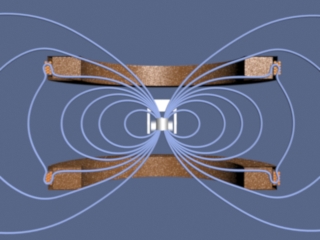| DESCRIPTION:
This animation shows the magnetic field of a permanent
magnet suspended by a spring in the TeachSpinTM
apparatus (see TeachSpin visualization), plus
the magnetic field due to current in the two coils (here
we see a "cutaway" cross-section of the apparatus).
The magnet is fixed so that its north pole points upward,
and the current in the two coils is sinusoidal and in
phase. When the effective dipole moment of the top coil
points upwards, the dipole moment of the bottom coil
points upwards as well. Thus, the magnet the magnet
is attracted to both coils, and as a result feels no
net force (although it does feel a torque, not shown
here since the direction of the magnet is fixed to point
upwards). When the dipole moments are reversed during
the second half of the cycle, the magnet is repelled
by both coils, again resulting in no net force.
This process can also be described in terms of tension
along, and pressure perpendicular to, the fieldlines
of the resulting field. When the dipole moment of the
coils is aligned with that of the magnet, there is a
tension along the fieldlines as they are "pulled"
from both sides. Conversely, when their moments are
anti-aligned, there is a pressure perpendicular to the
fieldlines as they are "squeezed" from both
sides.
|
|


